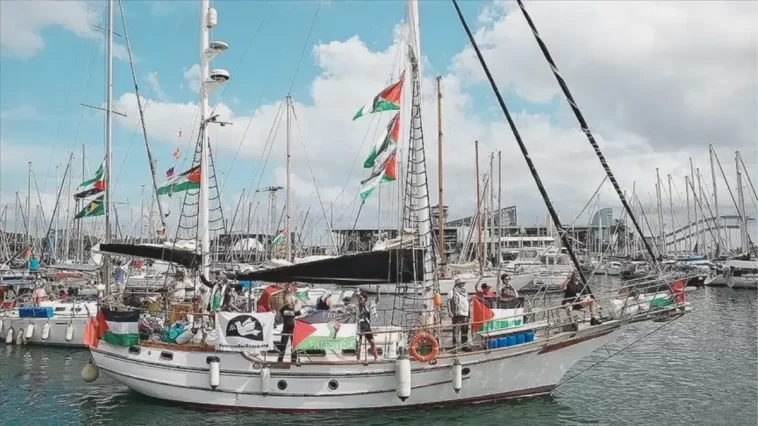The massive Global Sumud Flotilla, a coalition of dozens of civilian vessels determined to break the long-standing blockade on the Gaza Strip and deliver urgent humanitarian aid, is closing in on its destination. Sailing across the Mediterranean, the flotilla’s progress has been marked by resolve and rising international tension, with the journey now entering its most critical phase.
As of recent reports from the convoy, which has become the largest-ever civilian maritime effort of its kind, the ships are positioned just under 1,000 kilometers from the Gaza coastline, specifically noted to be approximately 995 km away when last reported near the coast of the Greek island of Crete. This proximity means the mission, carrying crucial medical supplies and other necessities, is facing the final, most contested stretch of its journey.
A Fleet Driven by ‘Sumud’: More Than Just Ships
The name of the mission itself, ‘Sumud’, is deeply symbolic and speaks volumes about the collective will driving the activists and humanitarians on board. Sumud (صمود) is an Arabic word meaning “steadfastness” or “unwavering resolve”. It’s a fundamental concept for Palestinians, representing the non-violent resistance to occupation through simply existing on the land, preserving identity, and maintaining community despite overwhelming adversity.
The flotilla’s mission is a physical manifestation of this powerful philosophy—a grassroots, civilian challenge to a humanitarian crisis that has seen international aid channels repeatedly restricted. Organizers have emphasized the symbolic and pragmatic nature of the journey: their goal is to not only deliver aid but to establish a viable humanitarian sea corridor that can be utilized by larger cargo ships in the future, thus fundamentally challenging the mechanisms of the 18-year-old blockade.
- Humanitarian Cargo: The vessels are loaded with substantial quantities of aid, with a particular focus on life-saving medical equipment and supplies urgently needed in Gaza’s devastated healthcare system.
- A Coalition of Resolve: The Flotilla is a truly international effort, reportedly comprising dozens of vessels and hundreds of activists, politicians, doctors, lawyers, and human rights defenders from over 40 countries. This vast coalition underscores the global concern over the crisis in Gaza.
Escalating Tensions and International Response
The journey has been far from peaceful. Flotilla participants have reported multiple instances of aggression, including drone attacks and explosions on or near their vessels while sailing in international waters, as well as experiencing communications jamming. These hostile acts, which have damaged boats and caused significant alarm, have spurred a notable, though carefully worded, response from European governments whose citizens are on board.
Naval Vessels Sent for Protection
In an unusual move that highlights the severity of the situation and the perceived threat to the civilians at sea, both Italy and Spain have dispatched military ships to the region.
- Italy’s Frigate: The Italian government, while officially condemning the attacks, initially sent a naval frigate to the area, primarily for potential search and rescue (SAR) operations and to ensure the safety of its citizens, including parliamentarians, on the flotilla.
- Spain’s Patrol Vessel: Similarly, Spain dispatched a maritime action vessel, emphasizing that its role is to intervene only in case of a humanitarian or rescue need and not to escort the flotilla directly into the blocked zone.
These deployments underscore the international recognition of the high-risk zone the flotilla is entering and the need to uphold the freedom of navigation and protection of civilian lives under international law. However, despite the protective presence, the mission remains highly controversial, with Israeli authorities vowing to prevent any vessel from breaching the naval blockade, which they describe as necessary to prevent arms smuggling. Israel has repeatedly called on the flotilla to divert its aid to a specified port for inspection and transfer.
The Legal and Diplomatic Battle
The Global Sumud Flotilla Coalition maintains that any attempt to intercept or attack their civilian vessels in international waters constitutes a violation of international law and a direct disregard for the principles established by the International Court of Justice. The activists, including legal teams sailing with the fleet, are prepared to contest any intervention, leaning on the right to peaceful protest and the urgent humanitarian necessity of their cargo.
The coming days will be crucial. As the flotilla closes the final nautical miles toward the coast, the political, legal, and humanitarian stakes could not be higher. The world watches to see if the powerful concept of ‘Sumud’—steadfastness in the face of immense pressure—will manage to pierce the blockade and bring aid to the millions in desperate need in Gaza.

